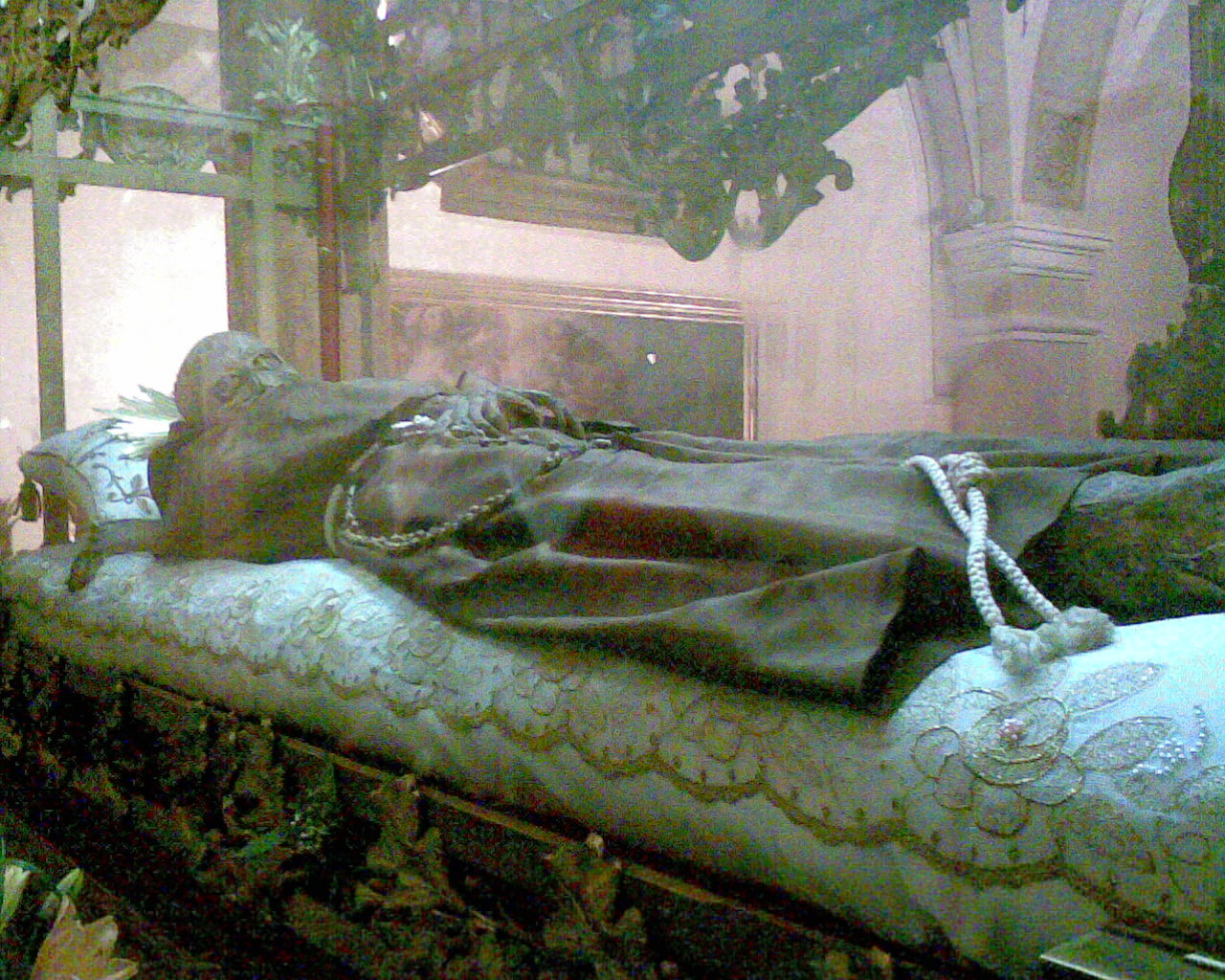Bienheureux Jacques Illirico
laïc
franciscain (✝ 1496)
Le bienheureux
Giacomo Illirico da Bitetto, laïc profès franciscain (1400 - 1496).
À Bitetto dans les Pouilles, vers 1485, le bienheureux Jacques,
religieux de l’Ordre des Mineurs, né en Dalmatie, d’une humilité remarquable.
Martyrologe
romain
Blessed James of
Bitetto, OFM (AC)
James received the habit of Saint Francis at Zara, but served as a lay
brother at Bitetto, near Bari in southern Italy. James possessed heroic
humility and reached the heights of heaven in his contemplation. During the
process of beatification, a fellow friar testified that he had seen James
levitate during prayer and heard him accurately predict the future.
While James was the
cook of the abbey at Conversano (18 miles from Bari), he would contemplate the
cooking fire and see the fires of hell or the spark of God's love that ignites
hearts. Often he would be found in the kitchen, motionless, rapt in ecstatic
contemplation. This happened one morning as he was fixing beans for that
night's dinner. He stood with his hand in the beans, tears streaming down his face
into the vessel before him. Thus he was found by the duke on whose estate the
monastery was founded. King Ferdinand I's courtier watched in amazement before
declaring, "Blessed are the religious brethren whose meals are seasoned
with such tears." Later that day James, learning of the duke's presence,
went to him and asked what he would like for his dinner. The nobleman replied
that he wanted nothing but some of the beans seasoned with James' tears.
Eventually James
was sent back to Bitetto where he died and where his incorrupted body remains.
Many miracles attributed to James' intercession have been recorded
(Benedictines, Husenbeth).
Blessed Jakov Varingez
Also known as
- Giacomo de Bitetto
- Giacomo of Bitetto
- Giacomo Varingez
- Giacomo Veringuez
- James of Bitetto
- James of Dalmatia
- James of Illyricum
- James of Sclavonia
- James of Zara
- James the Illyrian
- James the Slav
Profile
Son of Leonardo and
Beatrice Varingez. Jakov re-located to Bari, Italy to escape Turkish invaders. There he felt a call to religious life and joined the Order of Friars Minor at the friary of
Bitetto, Italy; he lived there nearly all the rest of his life. He served as cook, alms–beggar, gardener, porter, and sacristan. Known for being continually in prayer,
he was given to ecstasies,
noted as a miracle worker and for the ability to levitate.
In his 80’s he worked with victims of the plague of 1482.
Born
- 27
April 1496 in Bitetto, Bari, Italy
- body incorrupt about 20 years after his burial, and parts of the body are still so today
- 29 December 1700 by Pope Clement
XI (cultus confirmation)
- 19 December 2009 by Pope Benedict XVI (decree of heroic virtues)
Beato Giacomo da Bitetto Francescano
Zara, Dalmazia, 1400 ca -
1485/90
Della vita di fra Giacomo si hanno solo alcuni flash. Nato a Zara nel
1400 circa, lo lo ritroviamo giovane frate francescano nel convento di San
Pietro a Bari. Visse poi
a Conversano e Cassano delle Murge come cuciniere, ortolano e frate cercatore.
La nobile famiglia degli Acquaviva lo prese a benvolere. Ma - gtiunto in età
avanzata al convento di San Francesco di Bitetto - fu lui a salvare uno dei
membri della potente famiglia, il conte Andrea. Questi, inseguito da sicari del
re di Napoli, contro cui aveva congiurato, si era infatti rifugiato nel
convento. Per sdebitarsi gli Acquaviva fecero costruire la strada che collega
il luogo di preghiera con la città. Il frate, che aveva un'intensa vita
contemplativa, si prodigò nella carità per i poveri: sia nella peste del 1483,
sia nelle numerose siccità. Morto tra il 1485 e il 1490, il corpo vent'anni
dopo fu trovato incorrotto. È beato dal 1700. La festa porta a Bitetto molti
emigrati. (Avvenire)
Martirologio
Romano: A Bitetto in Puglia, beato Giacomo Varinguer da Zara, religioso
dell’Ordine dei Minori.
Nato nel
1400 circa a Zara, capitale della Dalmazia da Leonardo e daBeatrice Varinguez.
Venuto a Bari all'età di 18-20 anni dimorò nel conventodi S. Pietro. A Bitetto
arrivò negli anni 1438-39. Dimorò in Conversano eCassano delle Murge per poi
ritornare di nuovo a Bitetto.
Si narra che mentre il Beato Giacomo se ne stava in orazione dinanzi alla
cappella della Vergine,una lepre, inseguita da levrieri e cacciatori corre a
ripararsi sotto il suoabito, scampa il pericolo ed è dal Beato Giacomo presa in
braccio,accarezzata e benedetta.
"Fai una via che dalla città porta al convento"disse il Beato Giacomo
al Duca D'Atri e in una notte la strada fu bella efatta.
Prima di morire il Beato Giacomo piantò in terra, nel piccologiardino di
agrumeti, il suo bastone di legno di ginestra, che crebbe inalbero maestoso.
Dopo due secoli seccò, ma se ne conserva ancora nellostesso sito il tronco.
Morì fra il 1485/90 il 27 aprile.
Il Beato Giacomo è conosciuto e venerato soprattutto dagli abitanti deipaesi di
Toritto,Grumo Appula, Bitritto e la stessa Bitetto ed è assai noto fra gli
emigrati,soprattutto in America del Nord, partiti assai numerosi per tutto
ilNovecento da questi paesi.
Autore: Leonardo Acquaviva
